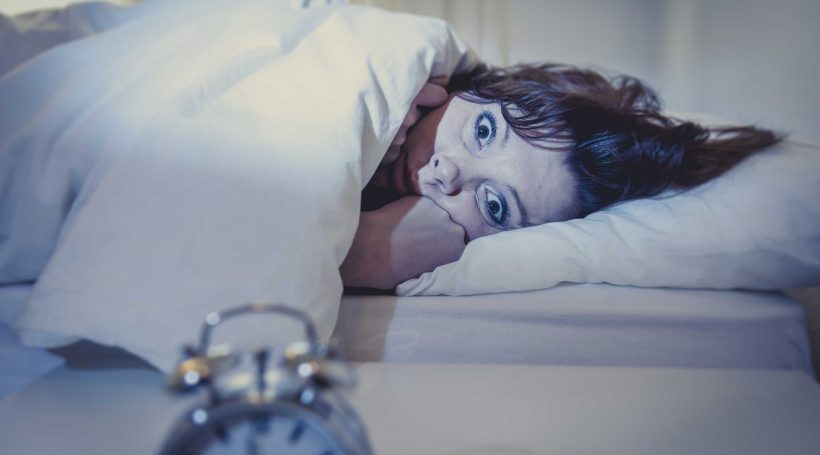Stephanie Mayernik, mom to Keira, 5, and Gavin, 8, knows all mothers worry – it goes with the territory. Recently divorced, she finds herself tossing and turning at night for a variety of reasons. From wondering how her divorce will affect her children to what lies ahead for her own future, the Mount Laurel mom seems to be counting sheep more often than she’d like.

Stephanie Mayernik and her kids Gavin, 8, and Keira, 5
“I have concerns about how my relationship is going to change with my children,” she says. “How do they view me now versus prior to the divorce? With this significant change in our lives, are they going to have a different opinion of me? Will they wonder what I did to their dad or what he did to me?”
Interactions Mayernik, 39, took for granted before – with teachers, her kids’ friends and their friends’ parents – are suddenly different. Even figuring out how to deal with her ex-husband is often confusing. When she isn’t worrying about her kids, Mayernik lies awake wondering about her own future. Suddenly her financial picture is very different, and she stresses about paying her bills.
She is not alone.
“Women are complicated creatures,” says Laura Picciano, DO, at Cooper University Hospital’s Ripa Center. “We might be caught in that sandwich generation where we’re raising our children and also caring for aging parents. We’re worried about our kids’ safety, their academic performance and social skills. So much is expected of children nowadays, it’s much more complicated. The increased amount of pressure on children definitely concerns moms.”
And that applies to children of any age. Lisa Halbruner, mom to adult children ages 25, 22 and 20, has seen her worries shift as her kids got older. “Now I worry when they make poor decisions, and I’m concerned about what the possible outcomes might be,” says the Voorhees resident. “I worry about them financially – that they can make it on their own and get ahead.
“I also worry about my dad, who’s getting older. I don’t live near him, so I can’t take care of him the way my sisters and my brother do, and that bothers me a lot. I worry about his health, because he lives by himself. I try to think of ways I can help from where I live.”
When we aren’t worrying about the people we care for, our thoughts drift to ourselves. “We’re concerned about our health, and we want to make sure that financially we’re up to speed,” Picciano says. “At 35 to 60 years old, a lot of these issues culminate. We start learning about someone who has a significant health problem, and it might even be ourselves. These are the ages when we start realizing our own mortality. We’re concerned if we made the right life choices or if we have regrets.”
Mayernik knows this all too well. “I’m refiguring what I want and need,” she says. “What I selected in a husband at age 20 is very different from what I’d select at 40. My kids have a dad. I have a house and a career. What I need now is someone for me.”
Physical changes as women age also contribute to sleepless nights. “Women tend to have a lot more insomnia than men do,” says Picciano. “It starts to increase in the years between 35 and 50, and that’s even before we experience the hot flashes and hormone shifts that are pronounced during menopause.”
“Now I can’t sleep because of aches, pains, restless legs and too much caffeine,” says Halbruner, 52. “I remember when I could drink a couple cups of coffee at night and sleep for eight hours.”
Caffeine can be a big problem, says Picciano, because in addition to keeping some people awake, “in many cases, it adds anxiety and leads to stress. It’s unbelievable what we see in the vital signs of someone who’s had four or five cups of coffee: higher blood pressure and tachycardia [too-rapid heartbeat], and they look stressed out.”
On the flip side are those who believe a few cocktails will relax them and help them sleep. “Hopefully they’re not mixing alcohol with medications; however, we all know people who may do that and put themselves in significant harm,” says Picciano. “And alcohol does disrupt the sleep cycle.”
Many women have come to believe that a lack of sleep simply is part of life, and we just need to adapt. But getting enough sleep, Picciano insists, will help put all our worries into perspective. And you can find safe ways to beat the cycle. For starters, keep a journal or notebook by your bed and keep track of what thoughts are keeping you awake.
“I’m a big fan of journaling,” says Picciano. “How much sleep are you getting? Are you going to bed outside of the time that’s reasonable to get enough sleep – eight hours is ideal. Are you using electronic devices? Computers and iPads with blue-ray light interrupt our sleep cycle. Write down when you’re waking up at night and why. What exactly are you worrying about? Just getting it out there is a very important part of self-care.”
Mayernik has found that making lists helps. “I write down things I can do tomorrow, and things I can’t do for another week,” she says. “I have to actively practice prioritizing and focusing on what I can achieve.”
Most importantly, Picciano urges women to discuss their concerns with their doctor. “We tend to think we can just take these issues on ourselves,” she says, “but lack of sleep chronically is a detriment that can interfere with everything from our weight to our performance in life in general.”













